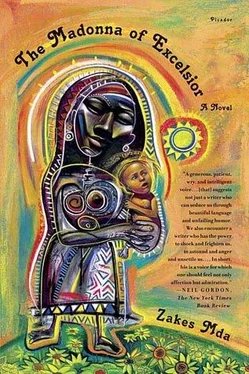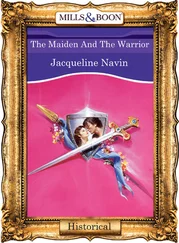Sekatle — the rich businessman who had now purchased a big house in town only two houses from Adam de Vries’s English bungalow — adopted the Baipehi and made himself their spokesman. He drove around the new settlement in his new Mercedes-Benz, making fiery speeches through a hand-held megaphone. He assured those who gathered around his car that the Movement would stand with them. The Movement had fought for liberation so that people could have roofs over their heads and bread and butter on their tables. The Movement would see to it that they were given title to the land they had already allocated themselves. The Movement would give them water and electricity and paved streets. The Movement. The Movement.
The destitute were given hope. Here was a man who stood with the people, even though he himself was so wealthy. A man who never forgot his humble origins. A man who had transformed Maria’s RDP house into a gleaming palace. If he looked after his sister so well, surely he would look after the interests of his destitute brethren and sistren just as effectively.
But the members of the Movement in the council did not see things with the same eye. Whereas Viliki wanted to take a hard line against the Baipehi, others felt that they should be allowed to stay. Or that, at the very least, the council should offer them alternative land on which to build their shacks. Popi agreed with this latter position.
“I do not think we have an obligation to give them alternative land,” said Viliki. “Where did they come from? Surely they must have lived somewhere before. They must go back there. We are not going to have a shanty town in Excelsior!”
“That is very callous, Comrade Mayor,” Popi argued. “These people are homeless. We cannot wish them away. It is our duty as the council to see to it that they are housed.”
“The land those people are occupying is earmarked for more RDP houses,” Viliki insisted. “The Baipehi must vacate it.”
This, of course, was a new development. The Pule Siblings/Pule Comrades no longer spoke with one voice in the council chamber. Their voices had separated into two. Distinct. Often shrill. They no longer confined their bitter disagreements to Niki’s shack or Viliki’s RDP house. They started by disagreeing publicly in the caucus of the Movement, then at its branch meetings and finally in the council chamber. These little tiffs embarrassed other council members of the Movement.
Lizette de Vries and her National Party members agreed with Viliki’s hard line. Tjaart Cronje, on the other hand, rejoiced at what he saw as the failure of the “affirmative action people” to govern the town in a civilised manner. He repeated that he had known things would come to this. They were definitely going to mess up a town that had been run efficiently for so many generations. The founding fathers must be weeping in their graves.
“This degeneration started three years ago when Popi Pule imposed English as the language of this chamber,” said Tjaart Cronje. “From then onwards I knew that things would go downhill.”
The members of the council had heard this line of argument before. Tjaart Cronje always found a way of linking any issue that arose in the council to the marginalisation of the Afrikaans language.
“Mr Cronje is out of order,” Viliki declared. “We are discussing the problem of the squatters here, which has nothing to do with his Anglo-Boer War.”
“It is true that the Afrikaner is still fighting the Anglo-Boer War,” Popi said, laughing. “His problem with English is a problem with the English. He would have no problem if we said the proceedings in this chamber should be in Sesotho. Indeed, Tjaart Cronje has even said that the only two languages that people speak here are Afrikaans and Sesotho. He is prepared to accept Sesotho even though it is a black language and he hates black people!”
Her three years in the council had taught her to analyse things in a manner that we had never thought possible.
“I do not hate black people,” said Tjaart Cronje in a pained voice. “The chair must protect me from this woman’s vicious tongue.”
“Ms Pule will have to withdraw those words,” said Viliki.
“I withdraw them, Your Worship,” said Popi, with a silly smirk in her voice. “But the point has been made.”
The council members of the Movement laughed and cheered.
“You have to withdraw unconditionally, Ms Pule,” insisted Viliki.
“I withdraw them unconditionally,” said Popi. “All I was trying to say is that when we say the proceedings must be in English, the Afrikaner feels that English is being promoted at the expense of his own language. He sees it as another victory of the English over his people in the ongoing Anglo-Boer War saga that has lasted for a hundred years. You cannot destroy the Anglo-Boer War mentality in the Afrikaner.”
“I object!” yelled Lizette de Vries. “You cannot generalise about Afrikaners.”
“Since when did she become an expert on the Afrikaners?” asked another council member of the National Party.
“You are all out of order,” screamed a frustrated Viliki. “We resolved that matter three years ago. Today all our minutes are in English — broken as it is. A person is free to speak the language of his or her choice in the chamber. That is why Mr Cronje always speaks in Afrikaans and Ms Pule always addresses this chamber in Sesotho. Our constitution allows that. Why should we go back to that issue now? We are talking about the squatters.”
“It is because Mr Cronje is still smarting over the fact that we write our minutes in English instead of Afrikaans,” said Popi, hoping that hers would be the last word on the matter.
“In rotten English!” said Tjaart Cronje. His had to be the real last word.
While the council was quibbling over irrelevancies, Sekatle had become the hero of the squatters. Not only did they sing his name, they danced it as well. In their chants he acquired the stature of the heroes of old: Moshoeshoe and Shaka. And of the stalwarts of the liberation struggle: the men and women who had languished in the prisons of South Africa and who had wandered in exile in foreign lands. Fighting for the very freedom now being denied to the Baipehi.
Sekatle is our new Mandela! Sekatle is the Father of the Orphans! Sekatle is our new Oliver Tambo! Sekatle shall free us from the pangs of hunger!
Viliki’s hard line began to soften. He told his comrades that he was prepared to compromise. He would find alternative land for the squatters if they vacated the land that had already been earmarked for RDP houses.
Popi was happy at this change of attitude. She took it upon herself to go to the squatter camp to negotiate with the Baipehi to accept an alternative piece of ground.
“We cannot leave this land,” a woman said. “We have paid for it.”
“Paid for it?” wondered Popi. “But you just gave yourselves this land. It belongs to the government for the new houses. How can you claim to have paid for it?”
“Oh, yes, we paid for it all right. Sekatle’s people collected the money from every one of us. They say it will make it possible for Sekatle to protect us from the likes of you.”
“From the likes of me? I have been on your side all along.”
“You are on the council, aren’t you? Sekatle says we can’t trust the town councillors any more. They are only looking after their own stomachs.”
It dawned on Pop that Sekatle’s interest in the squatters had not been fired solely by his community spirit. His keen business eye had spotted yet another moneymaking scheme. She walked to Sekatle’s shop and confronted him. He denied ever sending people to collect money from the squatters and challenged her to dare remove the Baipehi even if alternative land was provided. They wanted the land they had taken occupation of, or nothing.
Читать дальше












